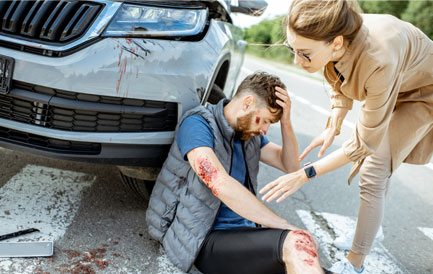4701 Oleander Drive, Suite A
Myrtle Beach, SC 29577
4701 Oleander Drive, Suite A
Myrtle Beach, SC 29577
Dillon Car Accident Lawyer
Dillon Car Accident Attorney
Car accidents involve a broad range of motor vehicle incidents, but even the most mild of them tend to have some level of costs associated with them. Working with a Dillon car accident lawyer, like one from Axelrod & Associates, P.A., could be critical to ensuring that you get the compensation that you’re owed for these costs.
There is almost always some level of damage to the vehicle that needs to be repaired. In more serious accidents, not only will there be greater damage to the vehicle, but it is also more likely that there will be injuries, along with all the costs that come with that. These losses are the responsibility of whoever is at fault for the accident.

What Does a Dillon Car Accident Law Firm Do?
A car accident lawyer can perform a number of different tasks and roles while representing you and seeking fair compensation for the injuries you’ve suffered.
Investigation
Often, the process begins with investigating the accident to understand where there is liability and who you should be seeking compensation from. We can look for evidence that can be used to prove that liability.
Negotiation
In most cases, this compensation is likely going to be paid by their insurance provider. Often, there will be an attempt to reach a settlement so that both parties can avoid the expense and time involved in taking the case to court. If this process is successful, then it can often mean getting your money months, if not years, sooner than you might if the case goes to trial.
Having a lawyer make the case for you can often mean that the other side will take the process a little more seriously. They know that they can’t get by with making an unreasonable offer, as a lawyer can recognize that strategy. At the same time, the presence of a lawyer on your side also demonstrates a credible possibility of the claim going to court, which they may be motivated to avoid.
Representation
If the case does go to court, we can act as your representative through the process. This means making the case for the liability of the other parties involved, along with defending against claims that you were liable. It also means proving the validity of the costs that you need compensation to cover. It’s your attorney’s job to fight for fair compensation on your behalf.
How Is Fault Proven in a Car Accident Personal Injury Claim?
Fault in a car accident claim is proven the same way that it would be in any other personal injury claim. This means proving liability on the part of whoever is at fault by using evidence such as:
- Facts
- Photos
- Videos
- Eyewitness accounts
- Expert witness testimony
To prove fault means showing that the defendant was negligent in a way that led to your injuries. Once this is demonstrated, you can collect compensation for those injuries. To prove negligence, your lawyer will need to demonstrate three factors:
Duty to Care
This concept is the idea that someone has a responsibility to ensure that their actions aren’t unnecessarily creating danger and risk for others. This is generally a given with regard to anything involving motor vehicles. We all have a duty and responsibility to take reasonable precautions, such as following the rules of the road and driving safely, to ensure that our actions won’t endanger those around us.
Breach of Duty
This means showing that the defendant failed to meet their duty to care. This is proven by both demonstrating what the defendant did or didn’t do and how that fell short of what they should have done. In a car accident, this often means failing to follow traffic laws, driving recklessly, driving drunk, or being distracted by a phone.
Cause of Injury
Lastly, your lawyer must be able to connect the breach of duty as the direct cause of the injuries that you suffered. This means that the breach must be the cause of the accident, and the accident must then be the source of the injuries.
There are breaches that may not be the cause of the accident. For instance, a missing headlight is a breach, but it is not the cause of the accident if the car is rear-ended. There are also situations where people have attempted to claim that unrelated or exaggerated injuries are the result of the accident. Therefore, your lawyer must make both connections for the jury.
What Is Compensated for in a Dillon Car Accident Claim?
Once negligence on the part of the defendant is established, you may seek compensation for costs that your lawyer can prove are a result of those injuries. These costs will generally be covered in two forms of damages:
- Economic Damages – If a loss has a clear financial component to it, then it is compensated through economic damages. This includes costs like medical bills, property damage, and lost wages that you incurred as a result of the accident. If your injuries are serious enough to require ongoing care or prevent you from returning to work at full capacity, then future medical bills and lost earning capacity are included as well.
- Non-Economic Damages – Those costs that are more psychological and emotional are addressed through non-economic damages. These include loss of enjoyment in life, mental anguish, and pain and suffering. The money won’t solve these issues, of course, but it can hopefully make them easier to handle.
FAQs
Q: How Long Do You Have to File a Car Accident Claim?
A: In most personal injury claims, which a car accident claim is a subset of, the statute of limitations is three years. This means that a claim must be filed within three years from the date of the accident for the court to hear the issue.
There are, though, a few exceptions based on who you are suing, when the injuries were discovered, and if the person injured was a minor. These differences could lengthen the time to file or shorten it, so it’s critical that you speak with a car accident lawyer soon after your accident. They can help you determine which deadline is relevant in your particular situation.
Q: Will I Receive Punitive Damages?
A: Punitive damages are a separate form of damages, which are different from the compensatory forms of damages. These damages are not determined by the costs that you suffered but rather by the behavior of the defendant. They are meant to act as a kind of punishment, so they are typically only awarded for behavior that is malicious or egregiously reckless.
Generally, though, the negligence that leads to a car accident is unlikely to fall into those categories, and punitive damages aren’t awarded in most car accident claims. However, a car accident lawyer can help you understand if they are relevant to your situation.
Q: How Does Comparative Negligence Affect My Claim?
A: Comparative negligence gives the defendant in a personal injury claim the opportunity to prove that the plaintiff was responsible for their injuries, whether in part or entirely. The defendant must prove the elements of negligence with regard to the plaintiff and their actions.
If that happens, then each party is given a percentage that reflects their fault in the accident. The plaintiff’s damages will then be reduced proportionately to their share of the injuries unless they are found to be 50% at fault. In that case, they will be prevented from collecting damages at all. If, for example, a plaintiff is found to be 15% at fault when their damages amount to $100,000, then the final amount they receive will be $85,000.
Q: Should I Settle My Claim or Go to Court?
A: The decision on whether to settle a claim or go to court is going to be a little bit different in every case. It largely depends on the particulars of your situation and what you’re seeking. The downside to settling is that it often means getting a little less money than if your court case was successful. However, it will result in you receiving your funds more quickly, as a court case could go on for months and even years. It also avoids the risk present in a court case, where the ruling could end up against your interests.
Get the Help of a Dillon Car Accident Lawyer
We understand how frustrating being the victim of a car accident can be. Dealing with any of the injuries you have can be hard enough, and the financial costs on top of that can make the situation all the more difficult. All of these costs, both financial and less tangible, are the responsibility of those who caused the accident.
However, in most cases, it will be their insurance company who will be paying. Getting what you’re owed from them, though, may require taking them to court or, at least, presenting a credible threat that you may do so. That’s why working with a Dillon car accident lawyer from Axelrod & Associates, P.A., can be so important to your case. If you think that you may have a car accident claim, contact us today.
Need help? Contact Axelrod & Associates, P.A.

Request your
Consultation
The fields marked with * are mandatory.






